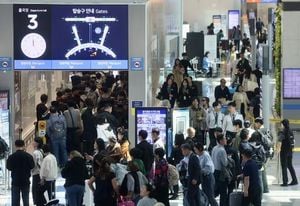South Korea's trade relationship with the United States is under intense scrutiny as the Ministry of Trade and Industry prepares to send a delegation to Washington, D.C. today, April 30, 2025, to initiate critical negotiations. The primary goal of these discussions is to mitigate the impact of U.S. import tariffs that are set to be fully enforced on July 8, 2025. The South Korean negotiation team is scheduled to engage in detailed talks with the Office of the United States Trade Representative (USTR), aiming to request exemptions or leniency on tariffs that could adversely affect key industrial products from South Korea, including automobiles, steel, and other goods vital to its economy.
In March, the U.S. announced import tariffs of up to 25%, which, if unchanged or if South Korea does not receive an exemption, will come into full effect in just a few months. This has raised significant concerns within South Korea's industrial sector. The recent movement ahead of this trip to Washington follows discussions last week between South Korea's Minister of Trade and Industry, Ahn Duk-geun, and Minister of Finance, Choi Sang-mok, who traveled to the U.S. to negotiate. Both parties agreed to collaboratively develop strategies to address the emerging issues.
Today’s negotiations are seen as a continuation of the cooperation and progress made in previous discussions. However, South Korean officials have emphasized that the current talks are not yet in the formal negotiation stage, but rather a preparation phase for what is anticipated to be a lengthy negotiation process. This is especially pertinent given the upcoming presidential election in South Korea on June 3, which could influence the direction of future negotiations. Additionally, political factors within the U.S. are also a significant variable affecting this negotiation process.
One major obstacle highlighted by Park Sang-taek, South Korea's Deputy Minister of Trade and Industry, is the U.S. Jones Act, which mandates that vessels transporting goods within the U.S. must be built in the country. This poses a significant barrier in negotiations concerning shipbuilding. Beyond import tariffs, South Korea is also negotiating a massive $44 billion liquefied natural gas (LNG) project with Alaska, as the U.S. seeks financial backing from both South Korea and Japan for this initiative.
Looking to the future, both nations have agreed to review non-tariff trade barriers (NTBs), which will encompass policies on exchange rates and regulations related to the import of automobiles, rice, and beef. The discussions taking place in Washington today are thus a pivotal moment that the world is watching closely, eager to see if South Korea can persuade the U.S. to ease import tariffs that threaten its economy, and how trade relations between these two economic powerhouses will evolve.
In a separate development, South Korea has officially launched an investigation into SK Telecom, the country’s largest mobile carrier, following a significant data breach. The Seoul Metropolitan Police Cyber Investigation Unit announced today, April 30, that a dedicated task force of 22 members has been established to probe the cyberattack that occurred on April 18, when SK Telecom detected signs of a major leak of customer USIM data.
SK Telecom's CEO, Ryu Young-sang, stated that the company is preparing for the worst-case scenario, acknowledging that the cyberattack could potentially compromise the USIM data of up to 25 million users. He described the incident as possibly the worst hack in South Korea's telecommunications history. The company has faced heavy criticism for taking two days to report the cyberattack, which violates laws requiring immediate reporting within 24 hours.
In response to the breach, SK Telecom has pledged to implement various measures immediately, including providing free SIM replacements for all affected customers and offering a USIM Protection Service to prevent illegal transactions at a level similar to that of a SIM replacement. The Personal Data Protection Commission has also begun investigating whether SK Telecom had appropriate security protocols in place to protect the USIM data stored on its main servers.
Meanwhile, the Eastern Economic Corridor (EEC) in Thailand has announced a partnership with K-Water, South Korea's leading water management state enterprise, to develop smart water management systems in the EEC area. This collaboration aims to establish 'smart water networks' alongside the development of smart cities within the EEC, focusing on promoting efficient, environmentally friendly, and sustainable water systems to support urban and industrial growth.
The memorandum of understanding (MOU) signed between the Eastern Economic Corridor Policy Office and K-Water marks a significant step in advancing the EEC towards becoming a Smart & Green EEC. This initiative is particularly important for infrastructure development, water management for economic and environmental security, and the advancement of smart industries, all of which are foundational for future urban development.
K-Water has played a pivotal role in developing smart cities in South Korea, such as the Busan Eco-Delta Smart City, which utilizes smart water systems to control water levels, prevent flooding, and manage water resources efficiently while integrating renewable energy in all aspects of the city. Additionally, K-Water is involved in developing model cities like Songsan Green City, which combines ecological design with smart water management, ensuring comprehensive water management from collection to treatment and reuse.
The collaboration between the EEC and K-Water is crucial for elevating Thailand’s standards in urban development and water resource management to a global level, with K-Water serving as a key partner in transferring knowledge and technology. This partnership is expected to lead to pilot projects in the EEC in the near future.





